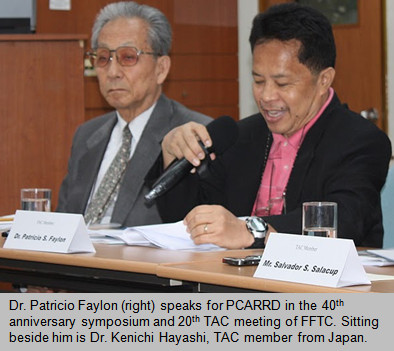 Twenty ten (2010) marks the 40th year of the Food and Fertilizer Technology Center (FFTC) based in Taipei, Taiwan. As a regional information center, it has collected and disseminated information on many modern and practical technologies for small farmers in the region.
Twenty ten (2010) marks the 40th year of the Food and Fertilizer Technology Center (FFTC) based in Taipei, Taiwan. As a regional information center, it has collected and disseminated information on many modern and practical technologies for small farmers in the region.
As part of its celebration, it organized an international symposium on Perspectives on Agriculture in the Asian and Pacific (ASPAC) Region. This symposium was held back-to-back with a meeting of its Technical Advisory Committee (TAC).
The activities provided a venue to discuss agriculture in the ASPAC Region, foremost among other issues and concerns. As a member of the FFTC-TAC, Executive Director Patricio S. Faylon represented PCARRD in the two activities.
The Committee is composed of leading agricultural scientists/experts in the region. They meet “every two years to advice on the formulation, implementation, and evaluation of FFTC work programs and activities. Committee members also deliberate on the agricultural needs and requirements of countries in the region; and suggest ways to improve the performance and effectiveness of the Center’s operation.”
During the meeting, agricultural experts from the ASPAC reviewed FFTC’s performance and achievements in the last 40 years. At the symposium, on the other hand, issues and concerns that would have the greatest impact on the present and future agricultural development goals in the ASPAC were tackled.
These issues were globalization, global warming, food safety and traceability, agricultural biotechnology, and agricultural biodiversity. The body agreed that globalization makes small-scale farmers, particularly from developing countries, more vulnerable. As such, national governments from the ASPAC were encouraged to design compensation schemes and structural adjustment for sustainable agricultural development.
Another threat to the stability and sustainability of agricultural production is global warming. Experts in the symposium recommended coming up with mitigation, adaptation, and impact assessment measures to face this issue. They also pushed for intensive R&D (research and development) to find ways to reduce GHG (greenhouse gas) emissions from the agricultural industry, as well as develop energy-efficient, sustainable, and eco-friendly farming practices.
On food safety and traceability, the participants discussed the role of standards in preventing unsafe food from reaching the table of the world’s growing population. During the symposium, agricultural biotechnology became a favorable option in addressing the increasing food demand amidst climate change. Experts advised national governments to support R&D in view of lack of capacity of resource-poor farmers to deal with risks associated with agri-biotechnologies.
The FFTC recognizes that many people’s food and livelihood security depend on sustained management of biological resources relevant to food and agriculture. Hence, it pushed for more focused investments on effective conservation and utilization needs at the national and international levels.
Finally, they agreed on directions and strategies for future policies and programs to enable the Center to make a more significant impact on the region’s agricultural development.
In general, the symposium aimed for a viable and sustainable domestic agricultural sector for economic development and poverty reduction among developing nations. Moreover, FFTC sees that small-scale farmers and rural non-farm sector will benefit from increased R&D investment, rural infrastructure, and private sector participation.
